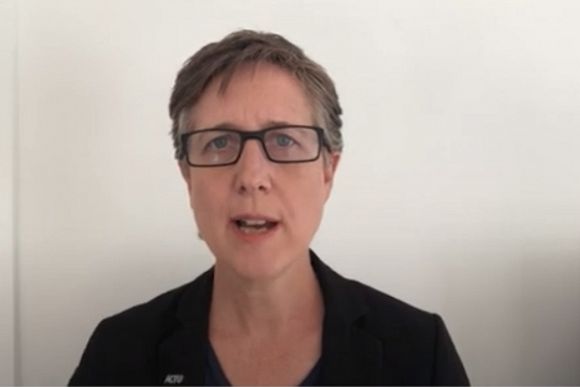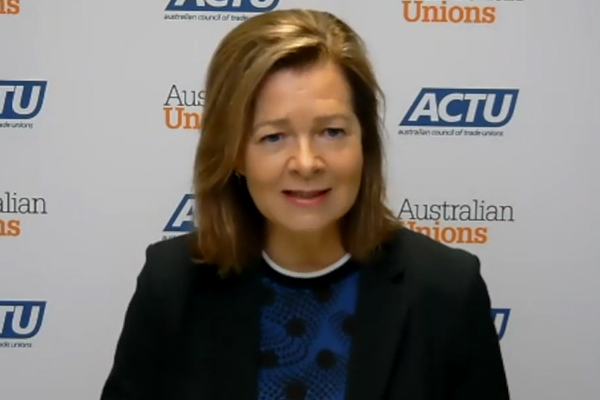The ACTU has criticised the Morrison Government's attack on the superannuation system and is pushing for reforms, writes William Olson.
IN DEFENCE of Australian workers’ wages and their retirement savings which are extended from it, the Australian Council of Trade Unions (ACTU) has red-flagged the shortcomings in general superannuation practices — and believes its benefits can be expanded to serve a greater number of workers.
Speaking before the organisation’s Superannuation Trustees Forum on Friday, ACTU President Michele O’Neil said that the Morrison Government cannot justify any excuse for the whole of 2020, not even that of a global COVID-19 pandemic, to justify its attack on the superannuation system:
“The pandemic cannot be used to justify an attack on super, the average worker is already expected to run out of super ten years before they die.
We need to reform the system to make it stronger, not gut it.”
The organisation which governs the nation’s union movement has pointed out that since the Abbott Government’s attack on the superannuation industry in 2014 that led to a seven-year freeze on the 9.5% rate, one related bombshell after another has proceeded to drop:
- the LNP Government’s freeze on superannuation increases thereby cancelled previously-legislated rises in superannuation which would have seen annual 0.5% increases resulting in funds peaking at a 12.0% cap by 2019;
- wages have stagnated since 2014, despite Tony Abbott’s claims at the time that the freeze on superannuation would have stimulated wages to increase;
- women have been more adversely affected than men when it comes to cuts to superannuation — 70% of Australian women possess balances of $150,000 or less, with nearly 25% of those women having under $50,000 in their superannuation funds’ accounts; and
- women over 50 currently comprise the largest demographic of the nation’s unemployed according to the Australian Bureau of Statistics (ABS) and also being the fastest-growing group of homeless persons in Australia — easily due to the fact that women retire with virtually half as much superannuation as do their male colleagues and counterparts.
And in an attempt to steer the ship of superannuation back on the right course, O’Neil and the ACTU have been pushing for a systematic set of reforms.
In addition to reinstating the 0.5% annual rise of the system’s rates with immediate effect that would see the rate capped at 12.0% now by the start of the 2025-26 financial year, the ACTU is also calling for superannuation to be paid on:
- every dollar earned, as opposed to a percentage of one’s pay-per-intervals;
- for instances of parental leave; and
- all workers, no matter their age, income, or status of employment.
The ACTU cites cases of 2.1 million workers – the majority of which are casuals working multiple jobs – being denied superannuation access, or even contributions towards their accounts, because they are earning $450 per month or less from any single employer.
O’Neil and the unions also argue that aside from casuals, women as a demographic group have it worse. And one union which possesses a vested interest in how women can benefit from improved superannuation status and contributions concurs.
The Australian Nursing and Midwifery Federation (ANMF), along with the Australian Services Union (ASU) and the Shop, Distributive and Allied Employees Association (SDA) remain allied in the belief that the Morrison Government possesses no interest in reducing the gulf in superannuation earnings between women and men, especially given that the industries and sectors which those unions represent are of a female-dominant nature.
Statistics which those unions collectively cite to back up their claims in the big picture are as follows:
- one in three women retire with no superannuation at all;
- women retire with 47% less superannuation than men;
- women over 55 years of age, as of last year and according to the Australian Human Rights Commission (AHRC), are classified as the fastest-growing group of homeless Australians, at a rate of increase of 31% between 2011 and 2016; and
- single females aged over 60 belong to the lowest-earning income group, at $30,000 per annum or less and as a result, are the worst at-risk group to fall into a state of poverty.
And to top it all off, in the statistical abstract that the ACTU cited, via the ABS, about the lack of superannuation commitment towards low-income earners or multiple-job holders, the ANMF, ASU and SDA jointly report the findings that women comprise 53.7% of that category.
As that trio of unions has called out for the same demands to fix the superannuation system that the ACTU has done on an at-large basis, they’ve also collectively added two other requests: fix the historical undervaluation of work predominantly filled by women and fix the gender pay gap.
Annie Butler, the ANMF’s Federal Secretary, said:
Research confirms that males appear to be rewarded for becoming parents whereas females are penalised for taking time away from paid work to care for newborns. Furthermore, the current structure of superannuation means that women can never catch up to comparable retirement savings without a range of interventions designed to benefit women.
The overall statistical evaluation shows that even in the midst of a pandemic not quite declared as being over and done with, superannuation assets increased by 0.6% to a total of $2.9 trillion, according to the Australian Prudential Regulatory Authority (APRA), who refers to themselves as an independent statutory authority that supervises institutions across banking, insurance and superannuation and is accountable to the Australian Parliament.
So wouldn’t that sort of an increase, even in times of a once-in-a-generational national recession, justify lifting the freeze on superannuation and take steps towards meeting the unions’ visions and demands on the system?
Federal Treasurer Josh Frydenberg – upon the announcement of a government review on the health of the system – stated that in favour of maintaining the freeze, older Australians should borrow against the equities in their homes and consult financial advisors in order to complement the 9.5% superannuation rate and the Age Pension when they go into retirement. Other Morrison Government ministers were still critical of the direction of industry-based superannuation funds themselves.
Jane Hume, the Government’s Assistant Minister for Superannuation, said:
Some of these funds have got very big and very influential and they seem to forget their job isn't to rebuild the economy or create jobs or reframe the climate debate or require industrial relations changes at companies they invest in.
We have supported the Prime Minister, Treasurer and assistant minister in their repeated promises on superannuation and we want to work with them to get sensible changes up that will boost member savings, get the economy moving and stop that ticking time bomb of our ageing population.
As all the evidence supports reinstating the incremental growth of workers’ superannuation accounts and moving towards making the system equitable for everyone, those who run Industry Super Australia – which constitutes 40% of the superannuation funds available – point out the hypocrisy of government officials standing in the way of making those actions actually happen.
Bernie Dean, ISA’s Chief Executive, said:
“The two-thirds of Australians who support the legislated and long-promised super increase would not take too kindly to politicians, who pocket 15% super on top of their generous salary, using this review to snatch away their retirement savings.”
William Olson is a freelance journalist and hospitality professional. You can follow William on Twitter @Will_O_Journo.
 This work is licensed under a Creative Commons Attribution-NonCommercial-NoDerivs 3.0 Australia License
This work is licensed under a Creative Commons Attribution-NonCommercial-NoDerivs 3.0 Australia License
Support independent journalism Subscribe to IA.















